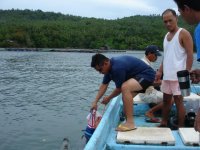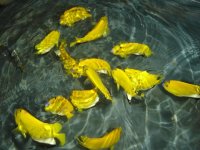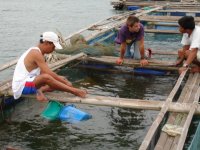Here is a closeup of Ralph doing his field work for CBUGS. He also has about 4 graduate students developing techniques for breeding and rearing about 20 species of marine aquarium fishes. It won't be long now until some of them are marketed through cooperating exporters and importers.
You are using an out of date browser. It may not display this or other websites correctly.
You should upgrade or use an alternative browser.
You should upgrade or use an alternative browser.
EASTI HatcheryGrowout
- Thread starter PeterIMA
- Start date
EASTI is also involved with training net-collectors and with opening up new areas for collecting. Many areas have been closed due to the stigma of cyanide fishing. Ralph and Ferdinand have been well received by muncipal officials who like the CBUGS program which allows for sustainable harvesting and does not harm the coral reefs. Attached is a picture of Flagfish angels that were net-caught. Rumor has it, that we may also see hatchery-reared angelfish being exported as a result of Ferdinand's efforts.
Attachments
Here is a closeup of the net-pens being used for growout of juvenile fishes, after the larvae have been reared past the critical period. Local fishers and collectors are being trained to rear marine aquarium fishes as an alternative livelihood. EASTI then help them market their fish.
Attachments
clarionreef
Advanced Reefer
- Location
- San Francisco
Great work work guys!
Steve
See people,
there are local people who can not only do the work being competed for by foreign groups...but better.
Steve
See people,
there are local people who can not only do the work being competed for by foreign groups...but better.
How much do they rely on food finding it's way into the net pins, and how much to they have to manualy feed?
Wayne Sallee
Wayne's Pets
[email protected]
Wayne Sallee
Wayne's Pets
[email protected]
clarionreef
Advanced Reefer
- Location
- San Francisco
Pilot projects are 25 years old in this reform thing....so...
Its good to see some real produce ready for shipping.
My main concern is that the bugs have not been worked out as far as shipping thru the wholesale chain and if that is true, the good work will always remain small.
This is because...transhipping to the more receptive retail customer will predictably and absolutely result in orders small, irregular, picky and top heavy on cherry-picking leaving the poor shipper with hundreds of leftover more common fishes that will starve or be returned to the ocean.
However, the friction grows on that end if divers don't get paid for this lost prodction.
Retailers are more accomodating to this smaller vision generally as they are getting fishes "half price"....but they hardly see the rest of the picture.
Surely. I am not the only Anglo in this equation that can understand that the divers need to get rewarded for all their fishes, [every week...] not just a few and that they absolutely depend on a larger economy of scale and a more general sale of the full variety that they offer....
Its impossible to collect only the top sellers and the most coveted fish.
So, if the enterprise does not come to terms with a general importer of the fuller variety that can hit the 500 kilo mark...at least 30 boxes...how on earth can the noble mission succeed?
Coming to terms is easy for business folk and darn near impossible for the rest.
For example, as a shipper of fishes myself, I already know what the landed cost on a fish has to be to excite buyers. If they cannot envision a 2.5 mark-up or a triple....you can generally forget about it.
If you try to force your own ideal price first [ done by all NGOs ] ...the customer can and will say no.
If you land in the ballpark of the conventional landed costs within a reasonable difference, there can be play in the deal.
Chasing small sales whilst the divers collect still another 75 coral beauties...and another is a mission impossible.
You must find a way to market what they actually get sustained numbers of and thats the challenge.
The market determines the price ultimately, not the socialist, green thinking, fair trade, idealistic visionary.
Fairtrade coffee from Nicaraguan co-ops struck a deal with Starbucks and they did not try to get half the cost of a cup a Joe. They got pennies on a cup....but they have a permanant deal.
I do not like this fact. I just know its a fact.
S
Its good to see some real produce ready for shipping.
My main concern is that the bugs have not been worked out as far as shipping thru the wholesale chain and if that is true, the good work will always remain small.
This is because...transhipping to the more receptive retail customer will predictably and absolutely result in orders small, irregular, picky and top heavy on cherry-picking leaving the poor shipper with hundreds of leftover more common fishes that will starve or be returned to the ocean.
However, the friction grows on that end if divers don't get paid for this lost prodction.
Retailers are more accomodating to this smaller vision generally as they are getting fishes "half price"....but they hardly see the rest of the picture.
Surely. I am not the only Anglo in this equation that can understand that the divers need to get rewarded for all their fishes, [every week...] not just a few and that they absolutely depend on a larger economy of scale and a more general sale of the full variety that they offer....
Its impossible to collect only the top sellers and the most coveted fish.
So, if the enterprise does not come to terms with a general importer of the fuller variety that can hit the 500 kilo mark...at least 30 boxes...how on earth can the noble mission succeed?
Coming to terms is easy for business folk and darn near impossible for the rest.
For example, as a shipper of fishes myself, I already know what the landed cost on a fish has to be to excite buyers. If they cannot envision a 2.5 mark-up or a triple....you can generally forget about it.
If you try to force your own ideal price first [ done by all NGOs ] ...the customer can and will say no.
If you land in the ballpark of the conventional landed costs within a reasonable difference, there can be play in the deal.
Chasing small sales whilst the divers collect still another 75 coral beauties...and another is a mission impossible.
You must find a way to market what they actually get sustained numbers of and thats the challenge.
The market determines the price ultimately, not the socialist, green thinking, fair trade, idealistic visionary.
Fairtrade coffee from Nicaraguan co-ops struck a deal with Starbucks and they did not try to get half the cost of a cup a Joe. They got pennies on a cup....but they have a permanant deal.
I do not like this fact. I just know its a fact.
S
Thanks Dr. Rubec. Beautiful pictures, beautiful project!
Aquacultured together with net caught fish is the new reality for industry and our hobby.
IMO very soon certified aquacultured and net caught fish will the only fish available from the Philippines.
Aquacultured together with net caught fish is the new reality for industry and our hobby.
IMO very soon certified aquacultured and net caught fish will the only fish available from the Philippines.
clarionreef
Advanced Reefer
- Location
- San Francisco
Wednesday August 9, 11:35 AM
Coral reefs benefit more from indigenous caretakers: study
A study has found traditional owners are taking better care of coral reefs than national parks and reserves.
The study found that the techniques employed by indigenous communities in Papua New Guinea and Indonesia are far more effective at maintaining fish numbers.
The research team led by the Australian Research Council Centre for Coral Reef Studies in Townsville, looked at the ecological and sociological dynamics of protected marine areas.
The centre's Dr Josh Cinner says the direct connection that indigenous communities have with their areas provide a better framework for conservation.
"This is something that, if they take care of, their grand kids and their grand kids could inherit as well," he said.
Dr Cinner says local communities care more about the reef because they live on it, and rely on it for survival.
Of course they do!!
The Easti project seems to be on the right track!
Steve
:lol: :lol:
Coral reefs benefit more from indigenous caretakers: study
A study has found traditional owners are taking better care of coral reefs than national parks and reserves.
The study found that the techniques employed by indigenous communities in Papua New Guinea and Indonesia are far more effective at maintaining fish numbers.
The research team led by the Australian Research Council Centre for Coral Reef Studies in Townsville, looked at the ecological and sociological dynamics of protected marine areas.
The centre's Dr Josh Cinner says the direct connection that indigenous communities have with their areas provide a better framework for conservation.
"This is something that, if they take care of, their grand kids and their grand kids could inherit as well," he said.
Dr Cinner says local communities care more about the reef because they live on it, and rely on it for survival.
Of course they do!!
The Easti project seems to be on the right track!
Steve
:lol: :lol:
The difference is that the indigenous communities in Papua New Guinea have not been exposed to the degree of corruption as people from coastal communities in the Philippines.
I really hope that the EASTI project works. Do they have the variety of fish and considerable stock of priced fish to supply the demand of importers in North America or Europe...... who want the fish for yesterday? If that is not the case they'll end getting fish from "regular" sources.
I really hope that the EASTI project works. Do they have the variety of fish and considerable stock of priced fish to supply the demand of importers in North America or Europe...... who want the fish for yesterday? If that is not the case they'll end getting fish from "regular" sources.
The CBUGS Program created by EASTI is a new program. There are a number of aspects to it. One is the emphasis on involving not only the fishermen but also Government officials associated with the LGU (municipality). Another aspect is the involvement of Business. Right now there is only one exporter involved in the Philippines. The plan is to expand the number of exporters as the supply of net-caught fishes and hatchery reared fish grows. Ferdinand and Ralph appear to be successful in getting the municipalities to open up areas that have been closed to aquarium fish collecting. Right now the variety is good, but more volume of quality net-caught fishes is necessary. The numbers of fishes being marketed will increase as more fishers become involved with sustainable harvesting using nets in the new areas.
The reference to Marine Protected Areas (MPAs) in Papua New Guinea is of interest. In the Philippines most MPAs are No Take Zones. So, they are anti-fishing. CBUGS is presently developing spatial management stategies to assist the LGUs by developing zoning strategies that can support protection of some areas as MPAs and other areas as MMAs. The Marine Managed Areas (or TURFs) are zones where fishing sustainably or mariculture will be allowed.
So, I am optimistic that the program can suceed to the benefit of the aquarium trade, conservation of coral reefs and coastal habitat s, and the local communities.
Peter
The reference to Marine Protected Areas (MPAs) in Papua New Guinea is of interest. In the Philippines most MPAs are No Take Zones. So, they are anti-fishing. CBUGS is presently developing spatial management stategies to assist the LGUs by developing zoning strategies that can support protection of some areas as MPAs and other areas as MMAs. The Marine Managed Areas (or TURFs) are zones where fishing sustainably or mariculture will be allowed.
So, I am optimistic that the program can suceed to the benefit of the aquarium trade, conservation of coral reefs and coastal habitat s, and the local communities.
Peter
Sci Guy,
There will be underwater surveys in the municipal waters. Most of these LGUs have already created MPAs and like the idea of alternative livelihoods for displaced fishers. So, there will be surveys in areas outside the MPAs in the municipal waters. The surveys will be funded from grants from the LGUs and from other sources. Much remains to be done to accomplish this and other aspects of CBUGS. But, I am confident that the data collected from the underwater surveys will be used to support management of these areas (both the MMAs and the MPAs).
In the case of ReefCheck, my reading of their postings is that they hand the survey data over to the MAC (so they can get paid from the MAMTI grant). I did not see an explanation about how the surveys would be used to support sustainable management. I think one of the ReefCheck scientists made some statements about how it would support the creation of MPAs. Perhaps someone can clarify this for me.
Peter
There will be underwater surveys in the municipal waters. Most of these LGUs have already created MPAs and like the idea of alternative livelihoods for displaced fishers. So, there will be surveys in areas outside the MPAs in the municipal waters. The surveys will be funded from grants from the LGUs and from other sources. Much remains to be done to accomplish this and other aspects of CBUGS. But, I am confident that the data collected from the underwater surveys will be used to support management of these areas (both the MMAs and the MPAs).
In the case of ReefCheck, my reading of their postings is that they hand the survey data over to the MAC (so they can get paid from the MAMTI grant). I did not see an explanation about how the surveys would be used to support sustainable management. I think one of the ReefCheck scientists made some statements about how it would support the creation of MPAs. Perhaps someone can clarify this for me.
Peter
The fishers will have a better understanding of what is sustainable than any Westerners swimming transects. Once they understand the economic benefits of a sustainable harvest, it will make it much easier to put it into practice. It's sort of like teaching the farmers in this country the benefits of crop rotation. These methods catch on because the results become obvious. I believe the fishers are intelligent and learning these things should be easy. When it comes to Western involvement "Less is more" :wink:
Dizzy, I completely agree. It is essential that the collectors be involved with the underwater surveys. Ferdinand has already done this with the MAC program to create CAMPs in 2002. I stressed the fact that collectors can be trained to collect data associated with underwater surveys in my presentation at the Marine Ornamentals Conference in Las Vegas this past February.
The MAC rejected this approach (the CAMPs created by the collectors with guidance from Ferdinand) in favor of having ReefCheck doing it using their methods (MAQTRAC). ReefCheck uses Filipino biologists to conduct the surveys with less community involvement.
Peter Rubec
The MAC rejected this approach (the CAMPs created by the collectors with guidance from Ferdinand) in favor of having ReefCheck doing it using their methods (MAQTRAC). ReefCheck uses Filipino biologists to conduct the surveys with less community involvement.
Peter Rubec
clarionreef
Advanced Reefer
- Location
- San Francisco
In Mexico from 1999-2003 we hosted a dozen biologists in survey work.
They ended up having us do the fish counts as we were familiar with every...single....species, whilst they had to keep coming back to the boat, rest a lot and keep checking their little waterproof cards and booklets to figure out what fishes they were looking at.
They were good at typing up all the data in the end but were pretty helpless underwater and at sea.
Steve
They ended up having us do the fish counts as we were familiar with every...single....species, whilst they had to keep coming back to the boat, rest a lot and keep checking their little waterproof cards and booklets to figure out what fishes they were looking at.
They were good at typing up all the data in the end but were pretty helpless underwater and at sea.
Steve
cortez marine":3ld05zv4 said:In Mexico from 1999-2003 we hosted a dozen biologists in survey work.
They ended up having us do the fish counts as we were familiar with every...single....species, whilst they had to keep coming back to the boat, rest a lot and keep checking their little waterproof cards and booklets to figure out what fishes they were looking at.
They were good at typing up all the data in the end but were pretty helpless underwater and at sea.
Steve
Yeah and they're blind as bats, too. I think all the book learning ruins their eyes.








